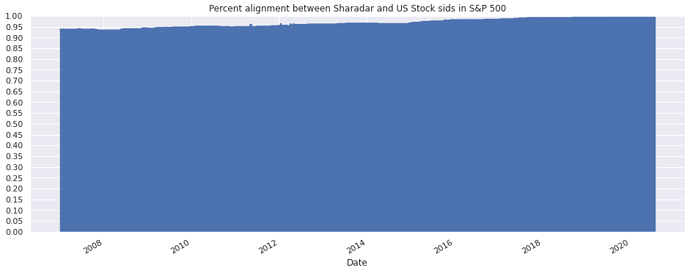Hi - I have upgraded to the new version 2.0 and can access sharadar data with no problems. I can run get_prices and get data back, same with fundamentals. These work fine:
prices = get_prices('usstock-1d', start_date='2020-06-01', fields='Close')
closes = prices.loc['Close']
I'm following along with the docs/guide and things fall over when i do the
are_in_sp500 = get_sharadar_sp500_reindexed_like(closes)
it just sits at busy forever, more than a half hour so far, have tried a couple of times after restarting docker. it still seems like it is doing something as the terminal 2 is still pumping things out - but it never completes or gets back to idle. I'd like to be able to have that reindex work and then create a universe of S&P 500 names or a filter from which to try some of the fundamental data on. I had this working in the previous version, excluding the sharadar sp500 data which is new. flightlog is spitting this out on repeat:
quantrocket_blotter_1|recycling spooler after 90 tasks
quantrocket_blotter_1|OOOPS the spooler is no more...trying respawn...
quantrocket_blotter_1|spawned the uWSGI spooler on dir /var/tmp/uwsgi/spool with pid 65
quantrocket_houston_1|172.18.0.22 - - [29/Jul/2020:14:39:07 +0000] "GET /master/securities.csv?vendors=ibkr&fields=ibkr_ConId HTTP/1.1" 400 137 "-" "-"
quantrocket_houston_1|172.18.0.22 - - [29/Jul/2020:14:39:07 +0000] "GET /master/securities.csv?vendors=alpaca&fields=alpaca_AssetId HTTP/1.1" 400 139 "-" "-"
quantrocket_houston_1|172.18.0.22 - - [29/Jul/2020:14:39:07 +0000] "GET /account/balances.csv?latest=True&fields=Account&fields=Broker&fields=Paper HTTP/1.1" 400 77 "-" "-"
quantrocket_houston_1|172.18.0.3 - - [29/Jul/2020:14:39:07 +0000] "GET /ibg1/gateway HTTP/1.1" 200 22 "-" "python-requests/2.22.0"
quantrocket_houston_1|172.18.0.22 - - [29/Jul/2020:14:39:07 +0000] "GET /ibgrouter/gateways?status=running HTTP/1.1" 200 3 "-" "-"
quantrocket_houston_1|172.18.0.3 - - [29/Jul/2020:14:40:07 +0000] "GET /ibg1/gateway HTTP/1.1" 200 22 "-" "python-requests/2.22.0"
quantrocket_houston_1|172.18.0.22 - - [29/Jul/2020:14:40:07 +0000] "GET /ibgrouter/gateways?status=running HTTP/1.1" 200 3 "-" "-"
any help well received.
D

